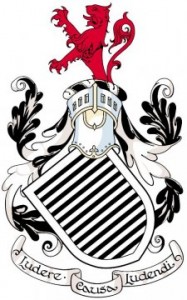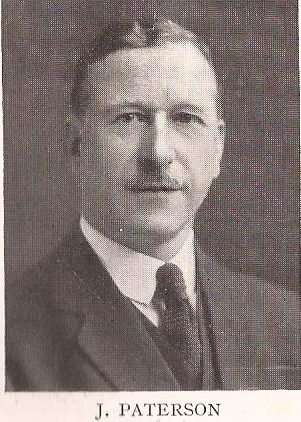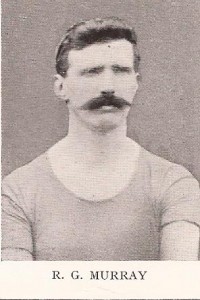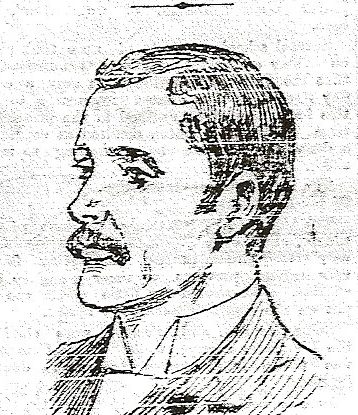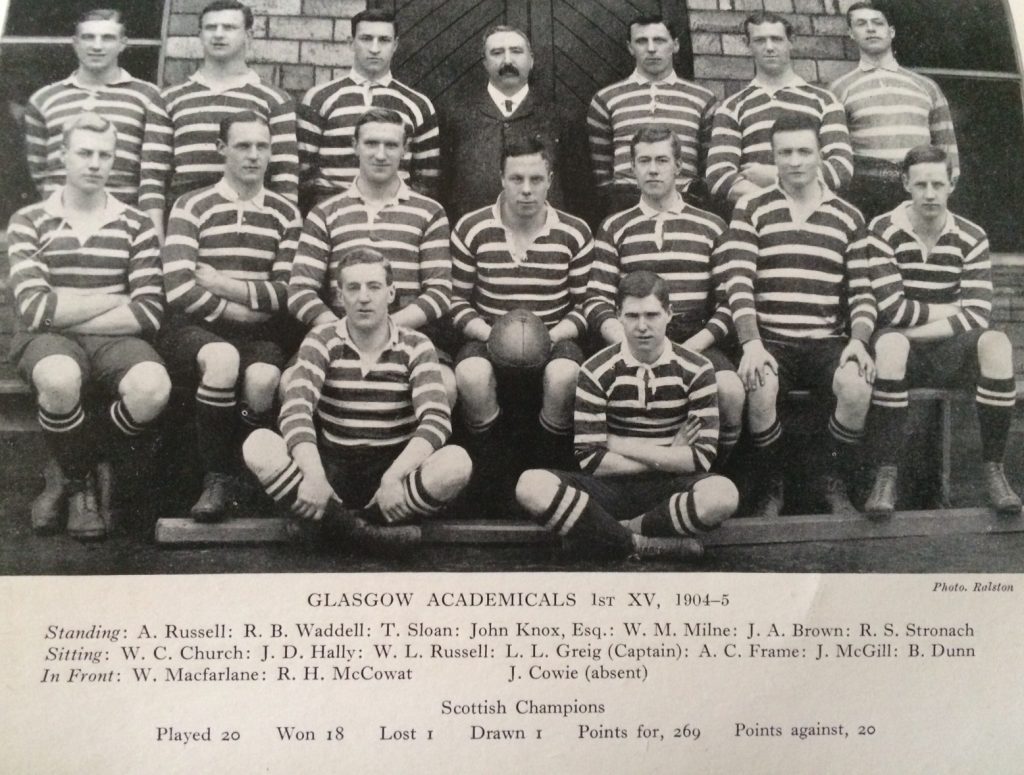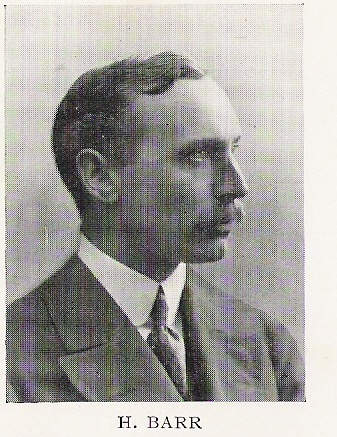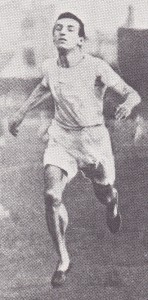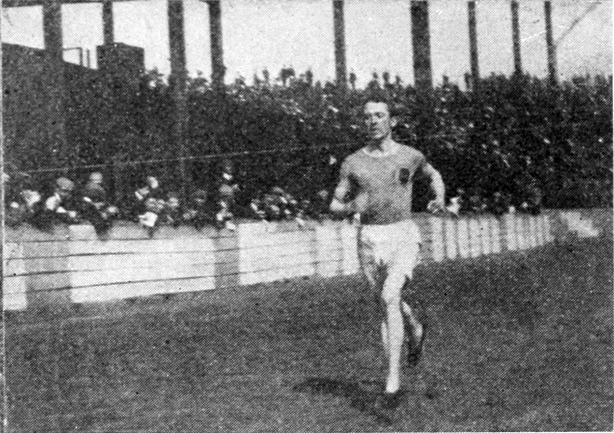1896 saw a continuation of the SAAU/SAAA split and the Heart of Midlothian Sports were conducted under the rules of the SAAU. Indeed the reports were that Hearts was the force encouraging the Edinburgh clubs to affiliate to the breakaway body. There was however no Queen’s Park Sports in 1896: the principal event in Glasgow was the Govan Police Sports at Ibrox and in Edinburgh the Hearts Sports led the way. On the second Saturday of the month the Glasgow Police Sports and the Clydesdale Harriers Sports took place in Glasgow, and the Edinburgh Harriers held their sports in Edinburgh under the SAAA rules. However there appears to have been no Queen’s Park event that year. That doesn’t mean that Hampden was out of athletic action: while the SAAU championships were taking place at Ibrox, the SAAA championships were taking place at Hampden.
But a year on, on 5th June,1897, they did take place and the Glasgow Herald report read: “The decision of the Queen’s Park executive to again cater to the tastes of amateurs was happily received in Glasgow and the West. The fact that Saturday’s programme contained over 500 entries, accompanied by a large and fashionable attendance of ladies and gentlemen proves conclusively that our amateurs are still a body worthy of attention despite the recent inroads made by those who only participate in athletics when pounds, shillings and pence are at stake.”
The programme included the following events (with winners):
100 yards: 17 Heats, four second round races and a final: RM Goldie, Airdrieonians FC
220 yards: 9 Heats: J Muir, QPFC
Half Mile: T Robertson, Olympic Harriers
One Mile invitation, 50 yards limit handicap: JC McDonald, Edinburgh
120 yards hurdles: 4 heats, 2 semi finals: AAG Stronach, Glasgow Academicals
High jump: TR Milne, Dundee Harriers
Broad Jump: W Bain, Maryhill Harriers
There were also three bicycle races.
4/6/1898 and the Queen’s Park Sports were back on the calendar. “In some respects the fare provided by the Queen’s Park on Saturday was the best and most varied that has been served to the athletics loving public this season,and yet the attendance numbered only between four and five thousand, or little more than a fourth of the assemblage that graced the recent cycling carnival of the Northern CCC. Even the Govan Police Sports, which are not to be compared in many ways with those of Queen’s Park, drew three times the number that were at Hampden Park. Without stopping to enquire into the cause or causes of the disparity, we can only regret that the public are not a little more discriminating in their patronage. The meeting at Hampden on Saturday was a model in point of management, and there was not a break in the continuing of enjoyment which the different events contested with more than ordinary vigour produced. If the sport was not strikingly brilliant there was at least a uniform excellence in all the events which accentuated public interest.”
The ‘Scottish Referee’ commented on the numbers competing and echoed the Herald’s compliments on the excellent management of the proceedings: “In tackling a programme that contained over 730 entries the Queen’s officials had a Herculean task set them last Saturday afternoon. It is most creditable to the management that in spite of this big handicap the meeting was run to the minute without a wait. As a sample of the smart timing, we may mention that the twenty one heats in which the hundred yards flat was decided, was run off in twenty five minutes. To the officials concerned in this excellent result, all prise is due, and they may stand as example for all others to copy and follow. If not brilliant individually or generally the sport was of all round excellence. An outstanding figure in the sprints was Hugh Barr, who is presently in excellent form. His strong physique aided him no doubt, but his pluck and speed assisted him nonetheless to the tape.”
There were certainly some talented and popular Scots in competition along with some English competitors. Hugh Barr the long jump record holder and prolific title winner and international sprinter has been mentioned already, RG Murray title winner and record setting high jumper and W Robertson, title winner and cross-country internationalist from Clydesdale Harriers were all competing. There was also a host of dignitaries fit to grace any meeting in the country. The Referee lists Arthur Geake, William Sellar, William Maley, DS Duncan, Humphrey Jones, Alexander Blair, JA Crerar, Andrew Hannah, Andrew Rennie and the handicapper was Bob Livingstone.
The sprints were the main thing according to the Referee. The 100 was won by Barr who did not participate in the 220 because he entered the long jump where he was second.. Popular winners of their heats in the 220 (which only had nine heats) were AS Maley and J Muir but neither were in the hunt when it came to dishing out the prizes. AAG Stronach won the hurdles easily but how about the Mile? There was a field of 78 runners on the track at the same time. “there is no doubt that the sight was a pretty one to see the kaleidoscopic changes in the multi coloured costumes of the aspirants for honours as they moved round the track. The scratch men had no earthly chance of getting through the multitude and they gave up long ere the finish.” It was won by David Rennie of Whiteinch Harriers (155 yards) from Brown of Bellahouston (120 yards). There was also an invitation mile (26 entrants, 13 starters) , won by Robertson in 4 min 25 3-5th sec. The half mile handicap was won by Bell of Airdrie.
The Herald also tells us that it was the ‘largest programme in the history of the club.’ Another successful sports meeting for Hampden.
Andrew Hannah
Held on 3/6/1899 , the report on the meeting started: “the Queen’s Park FC Sports on Saturday were replete with interest. There were no individual achievements of an outstanding character, the excellence was more general than special, and from this point of view the meeting will rank as one of the best of the long and brilliant series of functions held by the Queen’s Park.”
The ‘Scottish Referee’ added that a ‘good crowd was induced to attend’.
There may have been no individual achievements of note but there were individual of note competing. One was the reigning British one mile champion WH Welsh who won the mile in 4:27.2 and the article pointed out that the time is a better performance than it looks. Welsh’s best for the season up to that point was run on a heavy track with a ‘heavy breeze’. None of the short limit men in that race ran in the open mile so the men on the big handicaps had it all their own way. There were 58 in the race – all on the track at the same time – which was won by Robertson of Maryhill Harriers, off 125 yards, who was 30 yards clear of the second man, Parlane of the Rangers FC who was off 130 yards. Hugh Barr and RG Murray competed in the field events. Murray also ran in the 100 yards (20 heats), winning his heat but nowhere in the final which was won by Buchanan of Rothesay AAC who also won the 220 yards. The half mile as won by Dunn of Clydesdale Harriers in 2:01.2. The 120 yards hurdles was unusual that AAG Stronach won his Heat but was unplaced in the final which was won by D Carr of Maryhill. Murray and Barr were second in the high and broad jumps, although they each put in the best performance of the day. The broad jump was won by Blaney of a club called Dunaskin AC.
There were also the usual bicycle races.
RS Stronach, standing, right.
The 1900 meeting was held on 2nd June:
This important amateur meeting was held at Hampden Park under most favourable weather conditions on Saturday afternoon. There was a large and fashionable attendance and the music supplied by the Glasgow Highlanders was much appreciated.” The athletics was as enjoyable as the weather with many close finishes. Events and results:
100 yards: J Ford, Motherwell Harriers, 4 1/2 yards, 10 1/5th sec
220 yards: J Geackie, Springburn Harriers, 15 yards, 23 1-5th sec
half mile: HL Allan, Ayr Parkhouse, 55 yards 2 min 2 4/5th sec
one mile: J Paterson, Watsonians, 20 yards (back marker), 4:28 3-5th sec
120 yards hurdles: AAG Stronach, Glasgow Academicals
Broad jump: RS Stronach, Glasgow Academicals, 21′ (+ 2′ handicap = 23′)
high jump: Dead heat: JB Milne, Dundee and RG Murray, CH, both scratch, 5′ 9″
There were also four bicycle races.
In 1901, the position vis-a-vis the back markers and high handicap men was reversed with the back markers doing relatively well. Results:
100 yards: Dead Heat: J Ford, Motherwell, 1 yard and JA Campbell, Watsonians, 1 yard 1 seconds
220 yards: J Steel, Clydesdale Harriers, 10 yards, 23.6
Half Mile: PM Marshall, Clydesdale Harriers, 20 yards, 2:02.6
One mile: A Wright, Wellpark Harriers, 50 yards, 4:27.6
129 yards hurdles: RS Stronach, Glasgow Academicals, 18.6 sec
High jump: JB Milne, Dundee, scratch
Broad jump: D Carr, West of Scotland, handicap of 3′ 3″
In 1902 the sports were held on Saturday 6th but the rain in the morning was only one factor leading to a poorly attended function. The ‘Scottish Referee’ had this comment to make. “At Hampden Park where the last sports to be held under the auspices of the premier club but £80 was drawn. Whilst the weather accounts to some extent for the poor patronage, still it has to be feared that the public interest in athletics is not what it used to be. Since the decay of cycling, there has been a lack of novelty in our sports and in order to revive interest it may be well dor club committees to consider whether or not they can invent some royalties that will add a spice of variety and relieve the sameness of the pedestrian events.
Another factor which is acting against athletics is the want of men like Downer, Auld, Welsh,Hannah, Duffus and Robertson. Our present day sprinters and distance men are not of the class of these once famous athletes, and they fail to thrill the public by their performances. …. Time was when Queen’s Park introduced many leading Irish and English athletes, but for the past few seasons they have relied on native talent. This, however as we say, is presently so mediocre that it is difficult to be enthusiastic over it. In the sprints on Saturday they had a resident “foreigner” in SP Watson of Edinburgh University, an ex-London Hospital athlete. He was virtual scratch man in both 100 and 220 but showed no particular brightness in either event. … The winner of the 100 was found in JP Stark of the High School who had 5 yards. He ran with power and judgment and followed up his victory in the school event by taking this open event.”
Further down in the article he commented on the need of Queen;s Park as a club to recruit new men for the committee, concluding “never in the history of the club, since its institution in 1868 has it stood in greater need of leaders.” The article is one that it is worth reading in its entirety. However the sports themselves were very good.
There were twenty four heats of the 100 yards, four semi finals and the final which was won by JP Stark, the 220 had nine heats. and was won by Hutcheson of Kilbowie Harriers. The half mile was won by Small of Paisley Harriers from John McGough, with WH Mill, West of Scotland, winning the Mile. In the field events, RG Murray won the high jump from scratch.
JP Stark
It might be of interest to note some of the achievements of some of the competitors at the sports and their track performances in this decade:
Hugh Barr: 7 times Scottish Broad Jump champion; one 100 yards championship; two international victories.
Andrew Hannah: once mile champion, three times four miles champion and five times ten miles champion; five times cross-country champion.
James Paterson: twice Scottish one mile champion, four times four miles champion, once ten mile champion; two international victories
H Welsh: Twice 880 champion, twice mile champion. Six international victories including twice winning both half and mile v Ireland.
The reporter from the Scottish Referee might have been right about the poor standard of athletics in 1902 but the Queen’s Park meeting had at least two who would go on to great things in the sport. JP Stark would win many national titles and compete in international athletics; John McGough (below) would also win many SAAA titles at various distances and compete in the Olympics. But this would be the last QPFC Sports until 1907 – and even then there were committee members against holding them.
